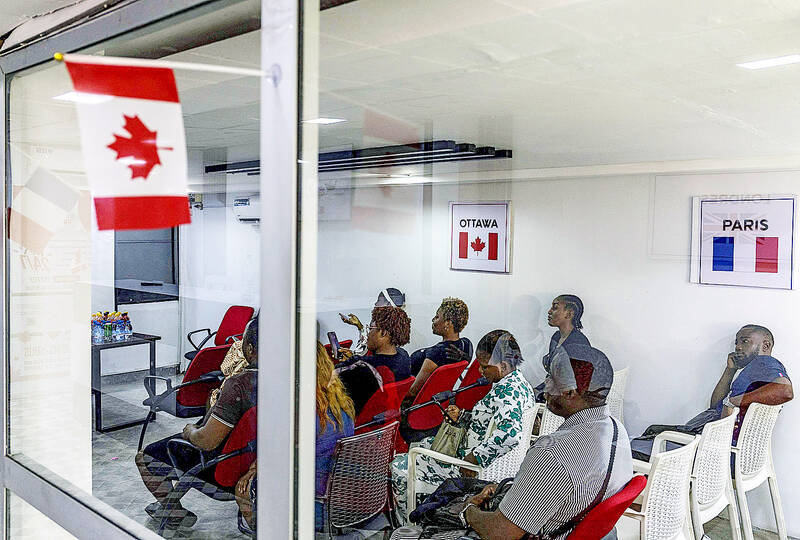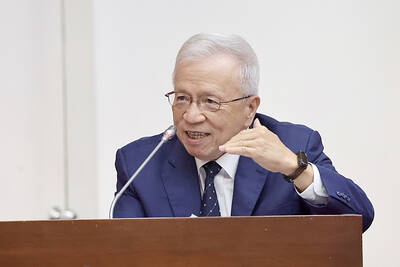With more than 40 percent of Cameroonians living below the poverty line, more than half the central African country’s young people dream of emigrating — and businesses helping them leave are thriving.
“We don’t promote immigration, but the demand exists and clients are easily won over,” said Stephane Bofia, the founder of Objectif Canada, an agency offering to “assist with the Canadian immigration process.”
In Cameroonian President Paul Biya’s more than four decades in power, he has failed to provide secure prospects for the country’s young people who have only ever known life under his rule.

Photo: AFP
Half the population of 30 million is under 20, and many of the younger generation are keen on better prospects than those offered under Biya, who is the world’s oldest head of state at 92 — and expected to win an eighth term in office today.
Unemployment in major cities stands at 35 percent, and graduates are looking elsewhere, fueling a lucrative brain drain market. Adverts abound for study visas, work visas and permanent residency papers abroad — although one professional warns that not all those offers are genuine.
A dozen red-and-white banners with maple-leaf borders flag the premises of Bodia’s Objectif Canada in the economic capital, Douala, with the North American nation a favored destination.
On the day Agence France-Presse visited, 38-year-old Michael was at the reception desk, making enquiries on behalf of his partner.
“She has a degree in IT [information technology] security, but hasn’t been able to find work in her field,” he said.
About 51 percent of young Cameroonians have thought about emigrating, according to a survey last year by the Afrobarometer institute.
“The search for work, economic difficulties and poverty are the main reasons” for wanting to emigrate, with North America the “preferred destination,” Afrobarometer said.
“That’s a loss” on several levels, political scientist Stephane Akoa said.
Those emigrating were “highly qualified individuals,” and the public money Cameroon had spent on training them was being lost to their destination countries, he said.
Last year, Cameroon was the top source of new permanent residents in Canada, both in French-speaking Quebec with 9,127 people and in the English-speaking rest of the country with 10,395, official Canadian statistics showed.
Bofia confirmed emigration to Canada was “booming.” The 34-year-old computer scientist runs a Web site that helps Cameroonians prepare for the language exams required by Canadian immigration services. It charges 45,000 CFA francs (US$80) for three months’ work. Bofia also offers a personalized support service that costs “millions of CFA francs.”
Agricultural engineer Martial, 27, paid another agency in Douala about 3 million CFA francs for its services and hopes to leave for Canada within eight months.
“The opportunities here are reserved for a small handful of people,” he said.
Martial said he chose Canada, because he was encouraged by students already there, as well as a “more open and easier” immigration process than elsewhere.
In Martial’s view, today’s presidential election would not improve matters.
“There might be change, but I’d rather leave first,” he said.
Cecile, a 25-year-old studying for a master’s degree in law, said she wanted to leave Cameroon, because procedures for becoming a barrister were “very long — and you have to have connections.”
“I’ll come back,” she said. “But first I’m going to practice law in Canada for a few years, to give myself time to get my plans off the ground.”
While emigration businesses promise much, the sector is “riddled with scams,” said Ghislain Ngongang, a consultant who helps clients obtain visas for Canada and France.
“There are at least 200 agencies in Douala, but very few are reliable,” warned Ngongang, who said he had helped 40 people leave since the end of 2023.
Agencies offer a plethora of options on social media, with some promoting more unusual destinations with the promise of quick results.
A student visa for Belarus, available in three weeks for 2.75 million CFA, sought-after tiling jobs in Dubai, United Arab Emirates, and a three-month employment contract in Latvia are just some of the options on the list.
Theophile, a 24-year-old artist, said he would not be voting today, because he has “no hope left for the country” and dreams of living elsewhere.
At the first available opportunity, “I’m leaving,” he said. “Whatever the country.”

JITTERS: Nexperia has a 20 percent market share for chips powering simpler features such as window controls, and changing supply chains could take years European carmakers are looking into ways to scratch components made with parts from China, spooked by deepening geopolitical spats playing out through chipmaker Nexperia BV and Beijing’s export controls on rare earths. To protect operations from trade ructions, several automakers are pushing major suppliers to find permanent alternatives to Chinese semiconductors, people familiar with the matter said. The industry is considering broader changes to its supply chain to adapt to shifting geopolitics, Europe’s main suppliers lobby CLEPA head Matthias Zink said. “We had some indications already — questions like: ‘How can you supply me without this dependency on China?’” Zink, who also

At least US$50 million for the freedom of an Emirati sheikh: That is the king’s ransom paid two weeks ago to militants linked to al-Qaeda who are pushing to topple the Malian government and impose Islamic law. Alongside a crippling fuel blockade, the Group for the Support of Islam and Muslims (JNIM) has made kidnapping wealthy foreigners for a ransom a pillar of its strategy of “economic jihad.” Its goal: Oust the junta, which has struggled to contain Mali’s decade-long insurgency since taking power following back-to-back coups in 2020 and 2021, by scaring away investors and paralyzing the west African country’s economy.

BUST FEARS: While a KMT legislator asked if an AI bubble could affect Taiwan, the DGBAS minister said the sector appears on track to continue growing The local property market has cooled down moderately following a series of credit control measures designed to contain speculation, the central bank said yesterday, while remaining tight-lipped about potential rule relaxations. Lawmakers in a meeting of the legislature’s Finance Committee voiced concerns to central bank officials that the credit control measures have adversely affected the government’s tax income and small and medium-sized property developers, with limited positive effects. Housing prices have been climbing since 2016, even when the central bank imposed its first set of control measures in 2020, Chinese Nationalist Party (KMT) Legislator Lo Ting-wei (羅廷瑋) said. “Since the second half of

Taiwan Semiconductor Manufacturing Co (TSMC, 台積電) received about NT$147 billion (US$4.71 billion) in subsidies from the US, Japanese, German and Chinese governments over the past two years for its global expansion. Financial data compiled by the world’s largest contract chipmaker showed the company secured NT$4.77 billion in subsidies from the governments in the third quarter, bringing the total for the first three quarters of the year to about NT$71.9 billion. Along with the NT$75.16 billion in financial aid TSMC received last year, the chipmaker obtained NT$147 billion in subsidies in almost two years, the data showed. The subsidies received by its subsidiaries —